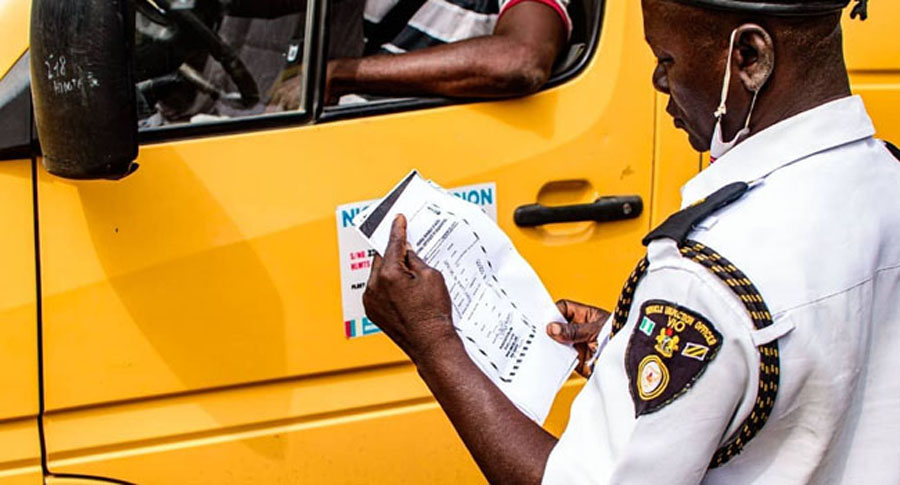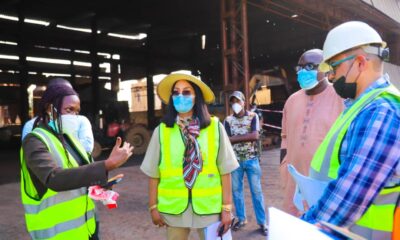Business
Nigeria’s debt of N31tn unsustainable, says LCCI

- Backs increase in electricity tariff, fuel price
- Seeks more mass transit buses, rail system
- Urges reopening of borders
The Lagos Chamber of Commerce and Industry has expressed worry about the nation’s state of economy, particularly the rising debt profile, currently put at N31tn, without corresponding output growth and economic development.
According to the LCCI, the growing level of the country’s debt is fast becoming unsustainable in the light of dwindling oil prices and production.
President of the LCCI, Toki Mabogunje, gave this position at a press conference on the state of the economy on Tuesday in Lagos.
She said the high level of debt servicing had continued to hinder robust investment in hard and soft infrastructure, described as key to stimulating productivity and improving living standards.
She said, “We note the increase in public debt stock was fueled by fresh domestic and external borrowing required to plug the wider fiscal deficit in the revised 2020 budget, given the impact of the pandemic on oil and non-oil sources of revenue.
“We also note the impact of recent exchange rate depreciation on the country’s level of external indebtedness.
“At the peak of the pandemic in the second quarter, the Federal Government received financial support worth $3.4 billion and $288.5 million from the International Monetary Fund (IMF) and African Development Bank (AfDB) respectively, while negotiations are also on-going for a cumulative $1.8 billion credit support from the World Bank, African Development Bank (second tranche) and Islamic Development Bank.
“Adding this to prospective domestic issuances could possibly push the country’s public debt stock to around N34 trillion by year-end, equivalent to 23 per cent of the GDP.”
On the nation’s accelerated inflation rate, Mabogunje said the persistent pressure on consumer prices stemmed largely from the sustained uptrend in food inflation.
She said the recent incidents of flooding in key food-producing states in the North had wiped off food and cash crops on a large scale and disrupted output projections in agriculture.
Mabogunje said that the situation, if not urgently addressed, would escalate the pressure on food prices, thereby putting the country on the verge of a food crisis.
She noted, “According to local media reports, over two million tons of rice were lost to flood; other crops such as sorghum, corn and millet were also affected.
“Rising inflation trajectory has serious implications for businesses regarding production cost, investment real return rate, and overall economic performance.
“Looking forward, the Chamber expects inflation to sustain its upward trajectory for the rest of the year.
“The Lagos Chamber calls on the fiscal and monetary authorities on the need to synergise to moderate domestic prices to a level conducive for sustainable and inclusive economic growth.
“The Federal Government might need to reopen the land borders to give succour to food prices in the light of lower domestic food supply amid huge demand for food.
“Similarly, both the federal and state governments also need to promptly address the issue of food wastage, majorly responsible for the food supply gap being experienced in the country.”
The LCCI president also advised policymakers on the formulation and implementation of policies to facilitate sustainability as business operators grapple with the devastating impact of the COVID-19 pandemic.
Mabogunje said such policies must support businesses, protect jobs, preserve investment and foster economic competitiveness at both national and subnational levels.
She said the chamber endorsed the adoption of the cost-reflective tariff regime in the power sector.
The LCCI president said the new tariff would attract investment and improve power supply, even as she noted that safeguards were needed to protect consumers from exploitation.
She said, “If the economics of the investment is not right, investors will not inject capital into the sector. However, there should be safeguards to protect consumers from exploitation.
“There should comprehensive metering of consumers and there should be value for money. We believe that policy should be given a chance.”
The LCCI president said the Solar Home Initiative, aimed at expanding energy access to 25 million individuals through the provision of solar home systems or connection to a mini grid was a step in the right direction.
She said the initiative would stimulate growth and productivity in the country’s rural economy.
Mabogunje also commended government on the recent reforms implemented in the downstream segment of the oil sector.
She said the removal of petrol subsidy and the proposal by the Nigerian National Petroleum Corporation to give up majority stakes in the four local refineries were laudable.
Mabogunje, however, appealed for the provision of mass transit buses, development of rail system for intra city and intercity transportation, and the acceleration of the auto gas programme so that more vehicles could be powered by gas.
She said, “We believe these measures are steps in the right direction in rescuing the economy from deepening fiscal crisis.
“We note that the subsidy regime had for long constituted a huge burden on public finances, encouraged corruption, inefficiencies, deterred investment flows, and weakened the earnings performance of oil refining and marketing companies.
“We acknowledge the effect of the price hike on the vulnerable segments of the society. Accordingly, we request that palliatives be provided in form of mass transit buses among other initiatives to ease the burden on consumers.”
Mabogunje also called for the expeditious passage of the Petroleum Industry Bill to consolidate recent reforms in the sector.
On the various fiscal and monetary interventions by the government, Mabogunje said the schemes would help with fulfilling payroll obligations and protect the jobs within the SMEs sector.
She said, “The Lagos Chamber acknowledges the various interventions of the fiscal and monetary sides of authorities in mitigating the adverse impact of the pandemic on economic and business environment.
“The federal and state governments need to expeditiously redirect attention to these sectors, including aviation, hospitality, entertainment, and manufacturing.
“This has become necessary to protect jobs, preserve investments and provide the much-needed liquidity required to revive these sectors.”
The LCCI president said the chamber noted the weak performance of the economy at the sectoral level, particularly among key sectors with potential to drive economic diversification.
Mabogunje said the 6.1 per cent contraction of the Gross Domestic Product in the second quarter reflected the profound impact of the pandemic on the economy.
She said the Chamber anticipated a marginal improvement in the GDP growth performance by the third quarter.
She attributed the anticipated improvement to the declining trend in the rate of confirmed cases of COVID-19, relaxation of various containment measures and the increasing tempo of economic activities.
On foreign exchange, the LCCI President said inappropriate forex policies could discourage fresh capital inflows on foreign direct investment, portfolio investment, remittances, and non-oil export proceeds into the economy.
Mabogunje said this was evidenced by the sharp plunge in the level of capital imported into Nigeria from $5.9 billion in the first quarter to $1.2 billion in the second quarter, partly caused by the capital control policy of the Central Bank of Nigeria.
She said, “The Chamber notes the various policy measures taken by the Central Bank of Nigeria to conserve the country’s foreign exchange resources in the light of weakening dollar inflows precipitated by the global pandemic.
“While the Lagos Chamber appreciates the efforts of the apex bank in preserving the scarce foreign exchange resources at a time the economy is confronted with the twin challenge of lower oil price and production, we believe demand management strategies alone are not sustainable solutions to the recurring foreign exchange crises.”
Business
Imo Economic Summit: Aliko Dangote Vows to Become State’s Largest Investor

Imo Economic Summit: Aliko Dangote Vows to Become State’s Largest Investor
OWERRI — Africa’s richest man, Aliko Dangote, has assured Imo State Governor Hope Uzodimma that the Dangote Group is prepared to become one of the biggest investors in Imo State, reaffirming the conglomerate’s commitment to expanding its footprint in Nigeria.
Speaking on Thursday during the opening session of the Imo Economic Summit 2025, Dangote called on the state government to specify key sectors requiring investment, promising immediate action once directives are given.
Dangote, who described Governor Uzodimma as a long-time friend, commended him for fostering an enabling environment for business and economic growth in the state.
READ ALSO:
- NSCDC rejects VIP protection requests from senators as demand surges after police withdrawal
- Edo Assembly Moves to Arrest Obaseki, Others Over MOWAA, Radisson Hotel Probe
- Three Top Contenders to Replace William Troost-Ekong as Super Eagles Captain
“We will be one of your biggest investors in Imo. So please tell me the area to invest and we will invest,” he said.
The African industrialist also encouraged Nigerian entrepreneurs to focus on developing their home regions, stressing that sustainable economic growth cannot depend on foreign capital alone.
“What attracts foreign investors is a domestic investor. Africa has about 30 percent of the world’s minerals. We are blessed,” he noted.
Dangote further highlighted progress at the Dangote Refinery, announcing that the facility is on track to achieve a 1.4 million barrels-per-day production capacity, making it the largest single-train refinery in the world.
The assurance marks a significant boost for Imo State’s investment outlook as the government continues efforts to strengthen its economy and attract large-scale private sector participation.
Imo Economic Summit: Aliko Dangote Vows to Become State’s Largest Investor
Auto
Court of Appeal Affirms Ruling Barring VIO from Seizing Vehicles or Fining Motorists

Court of Appeal Affirms Ruling Barring VIO from Seizing Vehicles or Fining Motorists
The Court of Appeal, Abuja, on Thursday, upheld a previous Federal High Court judgment prohibiting the Vehicle Inspection Officers (VIO) and the Directorate of Road Traffic Services (DRTS) from confiscating vehicles or imposing fines on motorists without lawful authority.
A three-member panel of appellate justices, led by Justice Oyejoju Oyewumi, dismissed the appeal filed by the VIO, describing it as lacking merit and affirming the October 16, 2024 ruling of the high court.
The original suit, marked FHC/ABJ/CS/1695/2023, was filed by public interest lawyer Abubakar Marshal, who alleged that he was unlawfully stopped and had his vehicle confiscated by VIO officials at Jabi District, Abuja, on December 12, 2023. He contended that the action was a violation of his fundamental rights.
READ ALSO:
- FG secures release of three Nigerians detained in Saudi Arabia
- Groups Reject Senator’s Call for Removal of NSA Nuhu Ribadu
- US authorities arrest Nigerian CEO Cashmir Chinedu Luke for alleged $7m VA fraud
Justice Nkeonye Maha of the Federal High Court had declared that no law empowers the VIO to stop, seize, impound, or fine motorists, and granted a perpetual injunction restraining the agency and its agents from further violating citizens’ freedom of movement, presumption of innocence, and right to own property.
The court held that only a court of competent jurisdiction can impose fines or sanctions on motorists. It further ruled that the actions of the Respondents violated Section 42 of the 1999 Constitution and relevant articles of the African Charter on Human and Peoples’ Rights.
Although the applicant had sought N500 million in damages and a public apology, the court awarded him N2.5 million. Respondents included the Director of the Directorate of Road Traffic Services, the Abuja Area Commander, the team leader, and the Minister of the Federal Capital Territory.
The appellate court’s decision confirms that the VIO and DRTS cannot legally harass motorists, reinforcing citizens’ constitutional rights on the road.
Court of Appeal Affirms Ruling Barring VIO from Seizing Vehicles or Fining Motorists
Business
BREAKING: CBN Removes Cash Deposit Limits, Raises Weekly Withdrawal

BREAKING: CBN Removes Cash Deposit Limits, Raises Weekly Withdrawal
The Central Bank of Nigeria (CBN) has announced sweeping changes to its cash-handling regulations, removing all limits on cash deposits and increasing the weekly cash withdrawal limit across all channels to N500,000, up from N100,000.
The changes were detailed in a circular titled “Revised Cash-Related Policies,” issued to all banks and signed by Dr. Rita Sike, Director of the Financial Policy & Regulation Department.
According to the apex bank, the revised framework is part of ongoing efforts to reduce the rising cost of cash management, strengthen security, and address money laundering concerns linked to Nigeria’s heavy dependence on cash transactions. The CBN noted that previous cash-related policies were introduced to discourage excessive cash usage and promote electronic payment systems, but evolving realities necessitated an update.
Effective January 1, 2026, several major adjustments will take effect. The cash deposit limit has been completely removed, and charges on excess deposits have been scrapped. Weekly withdrawal limits have also been increased to N500,000 for individuals and N5 million for corporate entities, with withdrawals beyond these levels attracting prescribed excess charges.
READ ALSO:
- U.S imposes visa restrictions on Nigerians over mass killings, alleged violence against Christians
- NDIC Warns Nigerians Against Ponzi Schemes, Urges Savings Only in CBN-Licensed Banks
- Nigeria Urged to Prioritize Citizenship, Social Harmony Amid Rising Conflict, Insecurity
The special monthly authorisation, which previously allowed individuals to withdraw N5 million and corporates N10 million once a month, has been discontinued.
For ATM withdrawals, the daily limit remains N100,000 per customer, with a maximum of N500,000 weekly, forming part of the overall withdrawal limit applicable to all channels, including POS transactions.
Excess withdrawals above approved thresholds will attract fees of 3% for individuals and 5% for corporate customers, shared between the CBN and the operating bank in a 40:60 ratio.
Banks have also been instructed to load all currency denominations in ATMs. The cap on over-the-counter encashment of third-party cheques remains fixed at N100,000, and such payments will count toward the cumulative weekly withdrawal limit.
Furthermore, financial institutions are required to submit monthly compliance reports to supervisory departments, including the Banking Supervision Department, Other Financial Institutions Supervision Department, and Payments System Supervision Department.
The circular clarified that revenue-generating accounts of federal, state, and local governments, as well as accounts held by microfinance and primary mortgage banks, are exempt from the new rules. However, long-standing exemptions previously granted to embassies, diplomatic missions, and aid-donor agencies have now been removed.
BREAKING; CBN Removes Cash Deposit Limits, Raises Weekly Withdrawal
-

 News3 days ago
News3 days agoDefence Minister Unveils New Security Strategy, Orders Troops to Shoot Armed Bandits on Sight
-

 metro3 days ago
metro3 days agoTeam Justice accuses authorities of attempting to exclude Mohbad’s father from DNA test process
-

 metro2 days ago
metro2 days agoSenate Launches Emergency Probe into Widespread Lead Poisoning in Ogijo, Lagos/Ogun
-

 International3 days ago
International3 days agoMeta to Block Under-16s from Instagram, Facebook, Threads ahead of Australia’s World-First Youth Social Media Ban
-

 metro3 days ago
metro3 days agoShocking confession: Boyfriend admits luring FRSC officer, child to death in Osun ritual murder
-

 Sports3 days ago
Sports3 days agoLeeds United Stun Chelsea 3-1 at Elland Road to Climb Out of Relegation Zone
-

 News3 days ago
News3 days agoBREAKING: Tinubu Sends Fresh Ambassadorial Nominations to Senate, Names Ibas, Ita Enang, Dambazau
-

 News3 days ago
News3 days agoEmber-months safety: Carloha, FRSC intensify campaign against distracted driving
















You must be logged in to post a comment Login